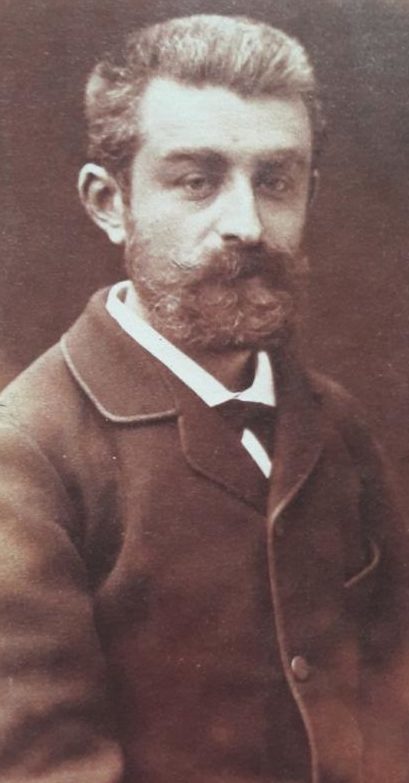And in fact, Durtal had only time to shake hands with the father, who put his luggage into the carriage.
There, when he was alone, seated, looking at the monk as he departed, he felt his heart swell, ready to break.
And in the clatter of the rails the train started.
Sharply, clearly, in a minute, Durtal took stock of the frightful disorder into which he had thrown the monastery.
“Ah! and outside it, all is the same to me, and nothing matters to me,” he cried. And he groaned, knowing that he should never more succeed in interesting himself in all that makes the joy of men. The uselessness of caring about any other thing than Mysticism and the liturgy, of thinking about aught else save God, implanted itself in him so firmly that he asked himself what would become of him at Paris with such ideas.
He saw himself submitting to the confusion of controversies, the cowardice of conventionality, the vanity of declarations, the inanity of proofs. He saw himself bruised and thrust aside by the reflections of everybody, obliged henceforward to advance or retire, dispute or hold his tongue?
In any case peace was forever lost. How in fact was he to rally and recover when he was obliged to dwell in a place of passage, in a
soul open to all winds, visited by a crowd of public thoughts?
His contempt for relations, his disgust for acquaintances grew on him. “No, everything rather than mix myself again with society,” he declared to himself, and then he was silent in despair, for he was not ignorant that he could not, apart from the monastic zone, live in isolation. After a short time would come weariness and a void, therefore why had he reserved nothing for himself, why had he trusted all to the cloister? He had not even known how to arrange the pleasure of entering into himself, he had discovered how to lose the amusement of bric-à-brac, how to extirpate
that last satisfaction in the white nakedness of a cell! he no longer held to anything, but lay dismantled, saying, “I have renounced almost all the happiness which might fall to me, and what am I going to put in its place?”
And terrified, he perceived the disquiet of a conscience ready to torment itself, the permanent reproaches of an acquired luke-warmness, the apprehensions of doubts against Faith, fear of furious clamors of the senses stirred by chance meetings.
And he repeated to himself that the most difficult thing would not be to master the emotions of his flesh, but indeed to live Christianly, to confess, to communicate at Paris, in a church. He never could get so far as that, and he imagined discussions with the Abbé Gévresin, his gaining time, his refusal, foreseeing that their friendship would come to an end in these disputes.
Then where should he fly? At the very recollection of the Trappist monastery the theatrical representations of St. Sulpice made him jump. St. Severin seemed to him distracted and worn. How could he live among stupid people like the devout, how listen without gnashing his teeth to the affected chants of the choirs? How, lastly, could he seek again in the chapel of the Benedictine nuns, and even at Notre Dame des Victoires, that dull heat radiating from the souls of the monks, and thawing little by little the ice of his poor being?
And then it was not even that. What was truly crushing, truly dreadful, was to think that doubtless he would never again feel that admirable joy which lifts you from the ground, carries you, you know not where, nor how, above sense.
Ah, those paths at the monastery wandered in at daybreak, those paths where one day after a communion, God had dilated his soul in such a fashion that it seemed no longer his own, so much had Christ plunged him in the sea of His divine infinity, swallowed him in the heavenly
firmament of His person.
How renew that state of grace without communion and outside a cloister? “No; it is all over,” he concluded.
And he was seized with such an access of sadness, such an outburst of despair, that he thought of getting out at the first station, and returning to the monastery; and he had to shrug his shoulders, for his character was not patient enough nor his will firm enough, nor his body strong enough to support the terrible trials of a novitiate. Moreover, the prospect of having no cell to himself, of sleeping dressed higgledy-piggledy in a dormitory, alarmed him.
But what then? And sadly, he took stock of himself.
“Ah!” he thought, ” I have lived twenty years in ten days in that convent, and I leave it, my brain relaxed, my heart in rags; I am done for, forever. Paris and Notre Dame de l’ Atre have rejected me each in their turn like a waif, and here I am condemned to live apart, for I am still too much a man of letters to become a monk, and yet I am already too much a monk to remain among men of letters.”
He leapt up and was silent, dazzled by jets of electric light which flooded him as the train stopped.
He had returned to Paris.
“If they” he said, thinking of those writers whom it would no doubt be difficult not to see again, “if they knew how inferior they are to the lowest of the lay brothers! if they could imagine how the divine intoxication of a Trappist swine-herd interests me more than all their conversations and all their books! Ah! Lord, that I might live, live in the shadow of the prayers of humble Brother Simeon!” –J.K. Huysmans ‘En Route’


